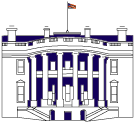
Tuesday, June 22, 2004Bush Claimed
Right to Waive Torture Laws By SCOTT LINDLAW,
Associated Press Writer WASHINGTON - President
Bush claimed the right to waive anti-torture
laws and treaties covering prisoners of war after
the invasion of Afghanistan, and Defense Secretary
Donald Rumsfeld authorized guards to strip
detainees and threaten them with dogs, according to
documents released Tuesday.  The
documents were handed out at the White House in an
effort to blunt allegations that the administration
had authorized torture against al-Qaida prisoners
from Afghanistan and Iraq. "I have never ordered
torture," Bush said a few hours before the
release. The
documents were handed out at the White House in an
effort to blunt allegations that the administration
had authorized torture against al-Qaida prisoners
from Afghanistan and Iraq. "I have never ordered
torture," Bush said a few hours before the
release.
The Justice Department, meanwhile, disavowed a
memo written in 2002 that appeared to justify the
use of torture in the war on terror. The memo also
argued that the president's wartime powers
superseded anti-torture laws and treaties. That 50-page document,
dated Aug. 1, 2002, will be replaced, senior
Justice Department officials said, speaking on
condition of anonymity. A new memo will instead
narrowly address the question of proper
interrogation techniques for al-Qaida and
Taliban detainees, the officials said, citing
department policy for requesting anonymity on
their comments. Bush outlined his own views in a Feb. 7. 2002,
document regarding treatment of al-Qaida detainees
from Afghanistan. He said the war against terrorism
had ushered in a "new paradigm" and that terrorist
attacks required "new thinking in the law of war."
Still, he said prisoners must be treated humanely
and in accordance with the Geneva Conventions. "I accept the legal conclusion of the attorney
general and the Department of Justice that I have
the authority under the Constitution to suspend
Geneva as between the United States and
Afghanistan, but I decline to exercise that
authority at this time," the president said in the
memo, entitled "Humane Treatment of al-Qaida and
Taliban Detainees." In a separate Pentagon memo, dated Nov. 27,
2002, the Defense Department's chief lawyer,
William J. Haynes II, recommended that
Defense Secretary Donald Rumsfeld approve the use
of 14 interrogation techniques on detainees at
Guantanamo Bay, such as yelling at a prisoner
during questioning and using "stress positions,"
like standing, for up to four hours. Haynes also recommended approval of one
technique among harsher methods requested by U.S.
military authorities at Guantanamo: use of "mild,
non-injurious physical contact such as grabbing,
poking in the chest with the finger and light
pushing." Among the techniques that Rumsfeld approved on
Dec. 2, 2002, in addition to that one, the yelling
and the stress positions: - Use of 20-hour interrogations.
- Removal of all comfort items, including
religious items.
- Removal of clothing.
- Using detainees' "individual phobias such as
fear of dogs to induce stress."
In a Jan. 15, 2003, note, Rumsfeld rescinded his
approval and said that a review would be conducted
to consider legal, policy and operational issues
relating to interrogations of detainees held by the
U.S. military in the war on terrorism. Rumsfeld's decision was prompted at least in
part by objections raised by some military lawyers
who felt that the techniques approved for use at
Guantanamo Bay might go too far, officials said
earlier this year. The review was completed in April 2003, and on
that basis Rumsfeld reissued his guidance on April
16, 2003. He approved 24 interrogation techniques,
to be used in a manner consistent with the Geneva
Conventions, but said that any use of four of those
methods would have to be approved by him in
advance. Those four were use of rewards or removal
of privileges from detainees; attacking or
insulting the ego of a detainee; alternating the
use of friendly and harsh interrogators, and
isolation. The April 2003 review said that removing a
detainees' clothing would raise legal issues
because it could be construed as degrading, which
is against the international convention on torture.
The removal of clothing, while approved by Rumsfeld
for use at Guantánamo Bay in late 2002, was
not among the authorized techniques in his revised
guidelines issued in April 2003. At the Justice
Department, senior officials said that the 50-page
memo issued to the White House on Aug. 1, 2002,
would be repudiated and replaced because it
contained what they called overbroad and irrelevant
advice. The memo, signed by
former assistant attorney general Jay
Bybee, included lengthy sections that
appeared to justify use of torture in the war on
terrorism and it contended that U.S. personnel
could be immune from prosecution for torture.
The memo also argued that the president's powers
as commander in chief allow him to override U.S.
laws and international treaties banning torture.
Critics on Capitol Hill and elsewhere have said
that memo provided the legal underpinnings for
subsequent abuses of prisoners in Afghanistan and
Iraq. Reacting to the White House release, Vermont
Sen. Patrick Leahy, the senior Democrat on
the Judiciary Committee, accused the administration
of continuing to withhold information. "Though this is a self-serving selection, at
least it is a beginning," Leahy said. "But for the
Judiciary Committee and the Senate to find the
whole truth, we will need much more cooperation and
extensive hearings." Associated Press writers Curt
Anderson, Robert Burns and Scott Lindlaw
contributed to this article. Copyright © 2004
The Associated Press |